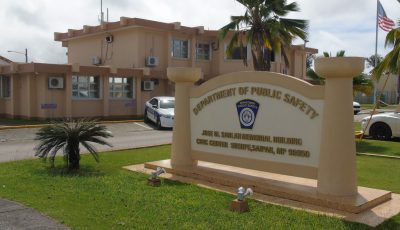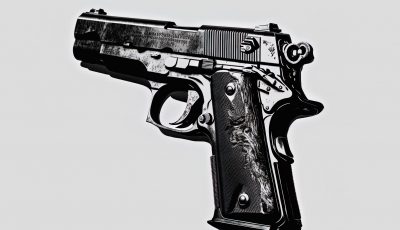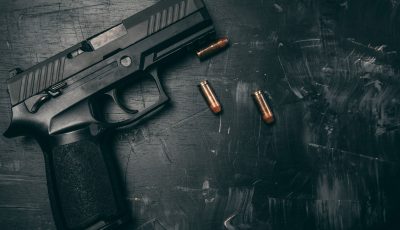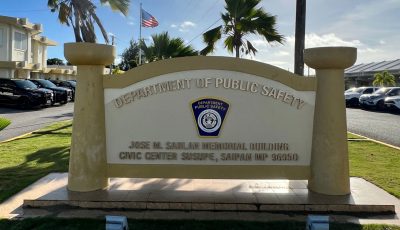Motion for criminal contempt vs DPS chief denied
U.S. District Court for the NMI Chief Judge Ramona V. Manglona has denied U.S. Army Ranger veteran Paul Murphy’s motion for the court to initiate criminal contempt proceedings against Department of Public Safety Commissioner Robert Guerrero, whom Murphy accused of violating the court’s order in connection with his previous lawsuit over a gun issue where he prevailed.
In her order last Wednesday, Manglona said she offers no opinion whether Second Special Act for Firearms Enforcement’s registration regulations would pass constitutional muster as that was not an issue presented to her when she issued the previous order that is the subject of Murphy’s motion for criminal contempt.
Manglona said she does, however, find that Guerrero (or the Commonwealth) has not willfully violated the court’s order stopping it from enforcing the registration requirements in 6 CMC Section 2204 because that section has been repealed.
The judge added that while SAFE 2 did not repeal or amend the language in 4 CMC Section 1407(b) that she had found unconstitutional, she notes that Murphy has not alleged that the Commonwealth seized or withheld any of his firearm because they were not registered. Therefore, Manglona said, to the extent that section 1407(b) is unconstitutional, Murphy has presented no evidence that the Commonwealth continues to enforce the unconstitutional aspects of that law.
In 2014, Murphy sued to challenge the CNMI’s gun control laws, as enacted in the Weapons Control Act and amended by the Special Act for Firearms Enforcement, Public Law 19-42, as violating his Second Amendment right to keep and bear arms.
On Sept. 28, 2016, Manglona ruled that some provisions of Commonwealth law unconstitutionally violate the Second and 14th Amendments. The judge held that the firearm registration requirements in the Commonwealth Code—as outlined in 6 CMC Section 2204 and the last sentence of 4CMC Section 14-7(b)—do not pass constitutional muster. Manglona permanently stopped Guerrero and the Commonwealth from enforcing those provisions.
Two months after Manglona’s ruling, the government enacted Public Law 19-73, or SAFE 2, on Dec. 1, 2016, repealing 6 CMC Section 2204 in its entirety and creating a new statutory structure, separating the provisions governing firearms licensing, now found at 6 CMC Sections 10601, and firearm registration, found at 6 CMC Sections 10701-10703. SAFE 2 did not repeal or amend 4 CMC Section 1407.
The last sentence of 4 CMC Section 1407(b) remains unchanged even if Manglona found that it violates the Second Amendment insofar that it is a registration measure: “However, firearms may not be released until complete payments of all taxes due and owing is made, and upon a showing that the firearm has been properly registered and that the owner has a valid Weapons Identification Card of Firearms Identification Card,” she said.
In 2016 and 2019, Murphy applied for a renewal of his individual firearms license under protest. He particularly objects to the following language in Section 3 of the application: “You may keep and possess(s) only the firearms that you register.”
Last Jan. 30, Murphy asked the court to hold Guerrero in criminal contempt for violating the court’s Sept. 2016, order by enforcing the firearm registration regulation. Murphy wanted Guerrero held in criminal contempt for DPS’ enforcement of the firearm registration provisions of SAFE 2, which he asserts is a violation of the court’s order finding the firearm registration requirements of the Weapons Control Act and SAFE 1 in violation of the Second Amendment.
Manglona does not interpret Murphy’s motion as an attempt to charge Guerrero and co-defendants with criminal contempt, which is clearly beyond his authority, but rather as a request that the court initiate criminal contempt proceedings pursuant to its authority based on the information he has provided.
In Guerrero or Commonwealth’s opposition to the motion, the government argued that it is not in violation of the court’s order because it is not enforcing the statutory provisions that the court had found unconstitutional.
Guerrero, through the Office of the Attorney General, argued that those firearm registration requirements were repealed, and the Commonwealth enacted new legislation, a statute it claims was designed to comply with the September 2017 order and, more generally, the Second Amendment.
The OAG said that, in his motion for contempt, Murphy misinterprets the court’s previous order. The OAG said the court did not hold that all registration requirements for firearms violate the Second Amendment. Instead, OAG said, the court limited its holding to the rationale presented for the Commonwealth registration requirements in the Weapons Control Act and SAFE 1. The court held that those registration requirements did not pass intermediate scrutiny because they did not rationally serve the Commonwealth’s stated interest in preventing gun-related deaths.
In denying Murphy’s motion for sanction, Manglona said she does not agree to the extent that Murphy appears to argue that the provisions of SAFE 2 are the same as those provisions the court found unconstitutional.
Manglona said as the Commonwealth points out, there are practical differences between the prior law and the current scheme for firearm licensing and registration.



























